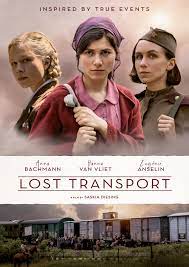
THE LOST TRANSPORT
Netherlands/Luxembourg/Germany, 2022, 100 minutes, Colour.
Hanna van Vliet, Eugenie Anselin, Anna Bachmann, Bram Suljker.
Directed by Saskia Diesing.
There is always another story to be told, even after 80 years and more, about World War II, about the Holocaust and the concentration camps. This is one of those stories, horrific in its background, hopeful in its humanity.
The setting is early 1945. The Russians have advanced into Germany, the prisoners in Auschwitz have to be moved, three trains moving west into Germany. This film is the story of one of those trains, stopped in a small German village, the starving and suffering Jewish prisoners desperate, travelling into the unknown, then stranded almost in the middle of nowhere.
While a lot of attention is given to the broad drama, the number of prisoners on the train, the need for food, their getting out of the train, their German overseers fleeing, Russian troops entering the village, a search in the shops and houses for food, the film focuses on one couple from the transport, Simone and Isaac, from Holland, eager to find a way home. There is a severe complication in terms of illness amongst the prisoners, Isaac succumbing, Simone wanted to care for him, reluctantly allowing him to go to the hospital for care.
But, in fact, this is the story of three women, antagonisms, bonding. Simone is a very strong character, determined to get home to Holland, loving Isaac, caring and protecting him. The next character is Vera, a Russian soldier, strong-minded, with the Russian ethos, having to make decisions about the village, about the transport sufferers. There is interaction with Simone, sometimes hard, sometimes brittle, but, ultimately, Vera’s humanity coming through, breaking through the letter of regulations.
The third character is Winnie, a young German teenager from the village, arrogant about the war, about Hitler, never dreaming that the war would come to an end with Germany’s defeat. She and her friends are very sure of themselves but as the transport arrives, the refugees coming into the town searching for food, she starts with a severe resistance. And, there is a focus on Simone as she and Isaac move into Winnie’s house. And, she encounters Vera’s severity with the occupying Russians.
We see the slow change in each of the women, their dramatic interactions, their more human interactions, Simone becoming more accepting, Vera questioning the severity of her ideology, Winnie having to accept defeat, except hardships, and bond with the two women.
This is the kind of story of World War II that is always relevant.
- The title, the episode, the evacuation of Auschwitz, the transports, the trains and their journeys?
- Audiences and Holocaust stories, Auschwitz stories, like in the concentration camps, the freeing of the camps, the plight of the prisoners, refugees? The German guards, their abandoning the prisoners?
- 1945, the ending of the war, the atmosphere, the camps, the SS, the trains, the condition of the prisoners, the Jews from all over Europe? The defeat of the Nazis, the end of the war?
- The village, remote from Berlin, the people, their way of life, German superiority, the reverse?
- The transport, stuck in the countryside, the number of refugees, audience empathy? Being abandoned, uncertainties, the need for food, going into the village, the response of the local people, finding food, going into the homes? Later illness and its spread, doctors, treatment, hospitalisation and quarantining?
- The focus on Simone and Isaac, their background, Holland, together, Simone venturing into the town, finding the food, I sack and support, his illness, Simone and shielding him in the house, his having to move into quarantine, treatment, her visits, death?
- The focus on Winnie, teenager, German, her friends, arrogant, reaction to the prisoners, sabotage, her house being occupied, Simone and Isaac, his illness, the reversal of roles, her being hungry? Her changing attitudes?
- The Russians, the focus on Vera, her role, the other officers, interactions, the Russian ethos, communist background, the role in the war, Stalin, the Nazis? Penetrating further into Germany, the liberation of Germany, the concentration camps?
- Vera, her role, military, becoming more humane, the interactions with Simone, with Winnie, the challenges to her compassion, especially with Isaac’s illness?
- The bonding of the three women, unlikely before this episode, the mellowing of each of them, Vera and her breaking through regulations, Winnie and her being treated well and learning compassion, Simone, the crisis with Isaac, her final decision, to return to Holland?
- A compassionate story, the story of three different women in war?